In medical AI, precision isn't optional, it’s foundational. Creating high-quality training data requires more than just labeling tools; it takes a unified system that brings annotation, validation, prediction, and compliance together into a single, intelligent workflow.
That’s where Gesund.ai comes in.
We’re not just another annotation tool. Gesund.ai is the AI infrastructure behind real-world clinical applications—built from the ground up for radiology, pathology, and multi-modal healthcare data. With native support for 2D, 3D, and microscopy annotation, our platform is designed for workflows that are accurate, explainable, and fully auditable.
Unlike many platforms that focus only on labeling, Gesund.ai combines medical focus, integrated validation, prediction support, and regulatory readiness—all in one. Today, we will focus on our Annotation Module.
Creating a Medical AI Annotation Project
Every workflow begins with structured project creation. Gesund.ai guides you through setup with inputs like:
Project Type (2D, 3D, Microscopy)
Imaging Modality (CT, MRI, Histopathology, etc.)
Assignment Mode (manual or rule-based)
Role definitions (Annotator, Reviewer, Viewer)
You can also import datasets via CSV or S3, connect to prediction models, and define class hierarchies and label sets.
Gesund.ai supports scalable, multi-modality studies with role-based views and both cloud and on-prem deployment options. Perfect for teams in hospitals, labs, and regulatory environments.
Tracking Annotation Progress with Full Transparency
The Annotation Dashboard provides visibility into:
Study assignments
Annotation completion by user
Segmentation previews
Audit trail of every action
User-based permissions let each stakeholder focus only on what matters to them, while project managers retain full control. This layered access model simplifies collaboration and ensures quality without confusion.
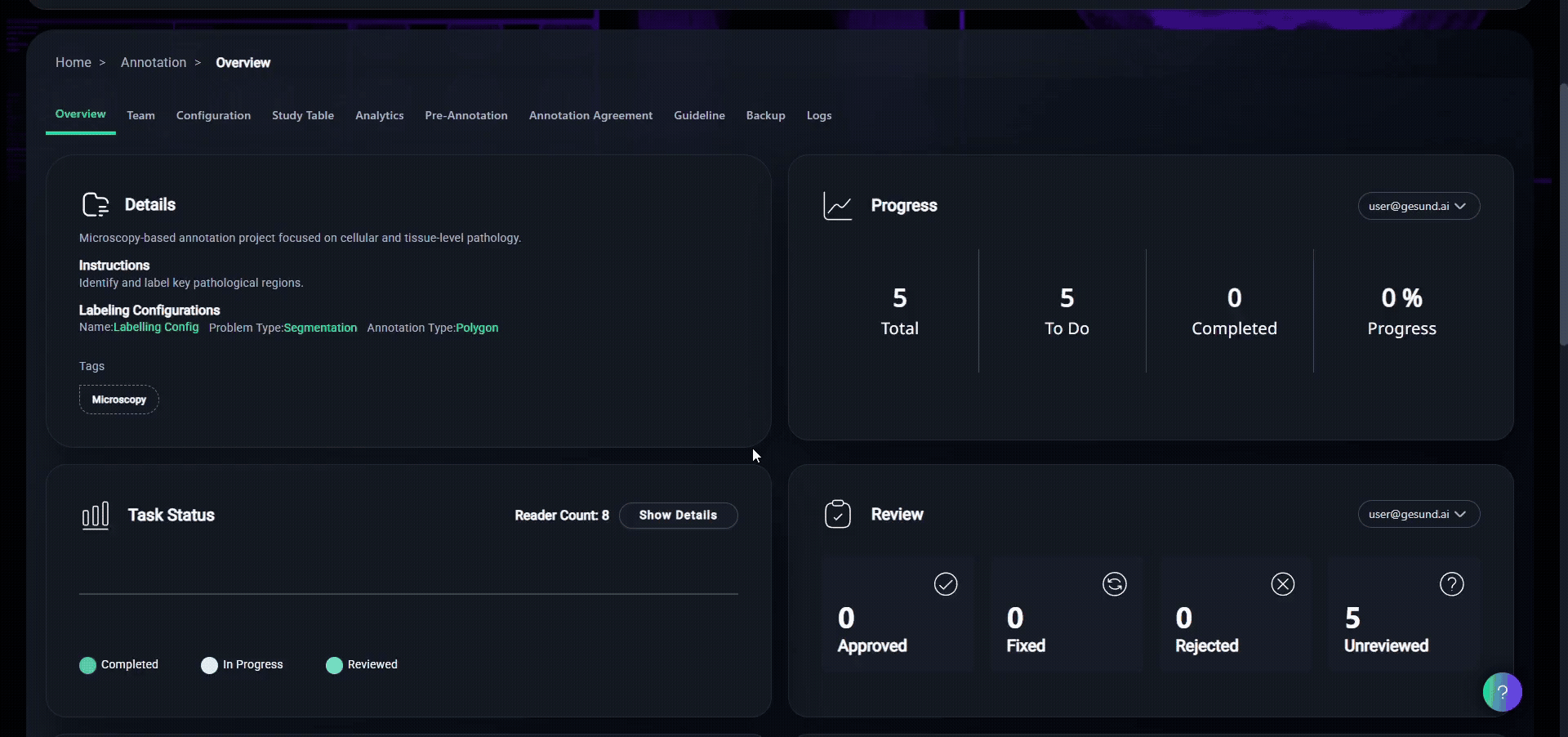
A Unified Viewer for All Data Type
1. Microscopy Annotation
Optimized for whole-slide images (WSI), Gesund.ai ’s viewer allows:
Smooth navigation of ultra-high-resolution slides
Region-based labeling of cell types
Custom colormaps, measurement overlays
Multi-object editing, label-level stats, audit trails
This is a microscopy-native environment, not a generic tool retrofitted for histopathology
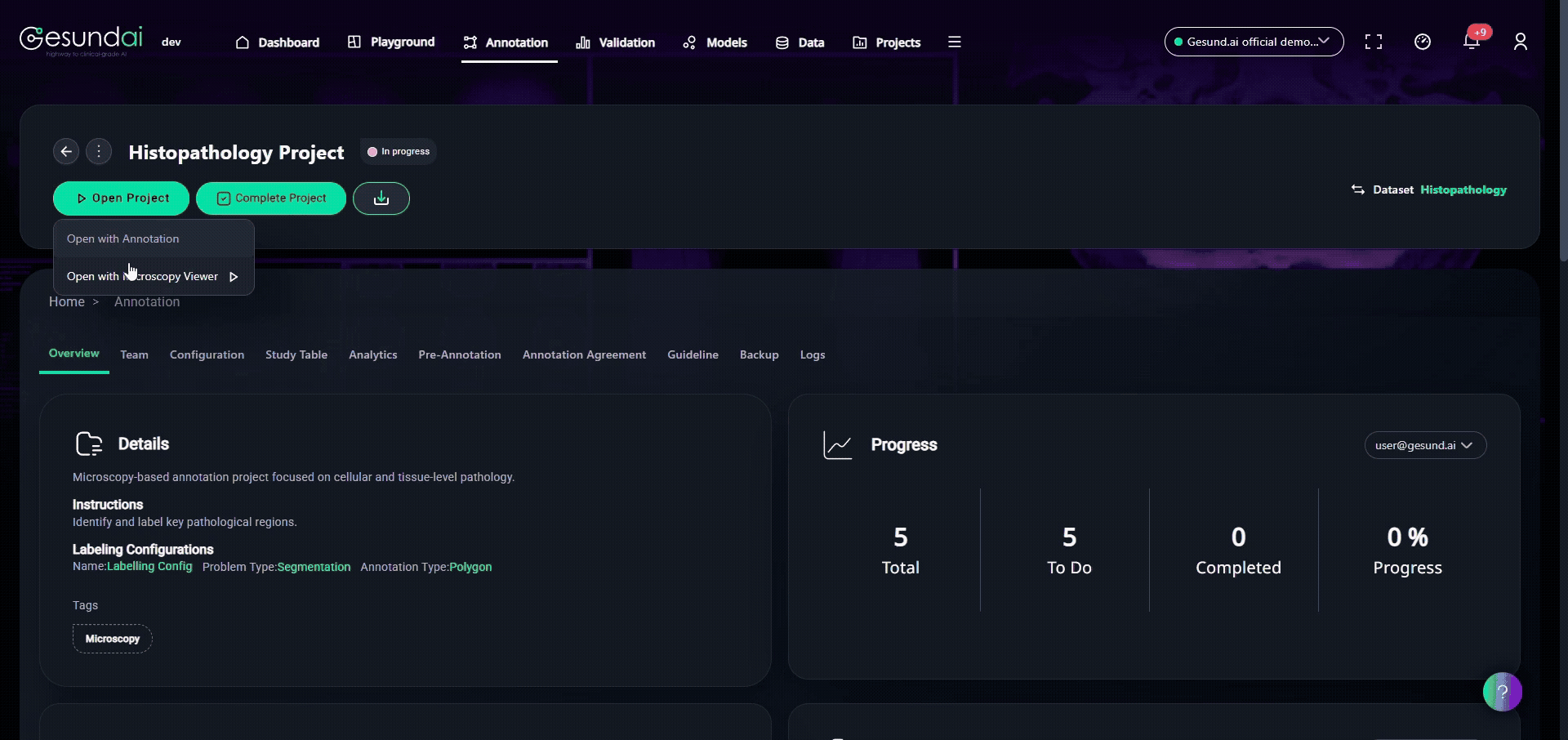
2. 3D Medical Imaging Viewer
For CT, MRI, PET and volumetric segmentation, the 3D viewer offers:
Keyboard or scroll-based slice navigation
Smart tools (region-growing, auto-propagation)
Lock/hide per class for multi-organ annotation
Real-time study tracking
Built to scale across the full human anatomy with AI-assisted and manual tools in the same interface.
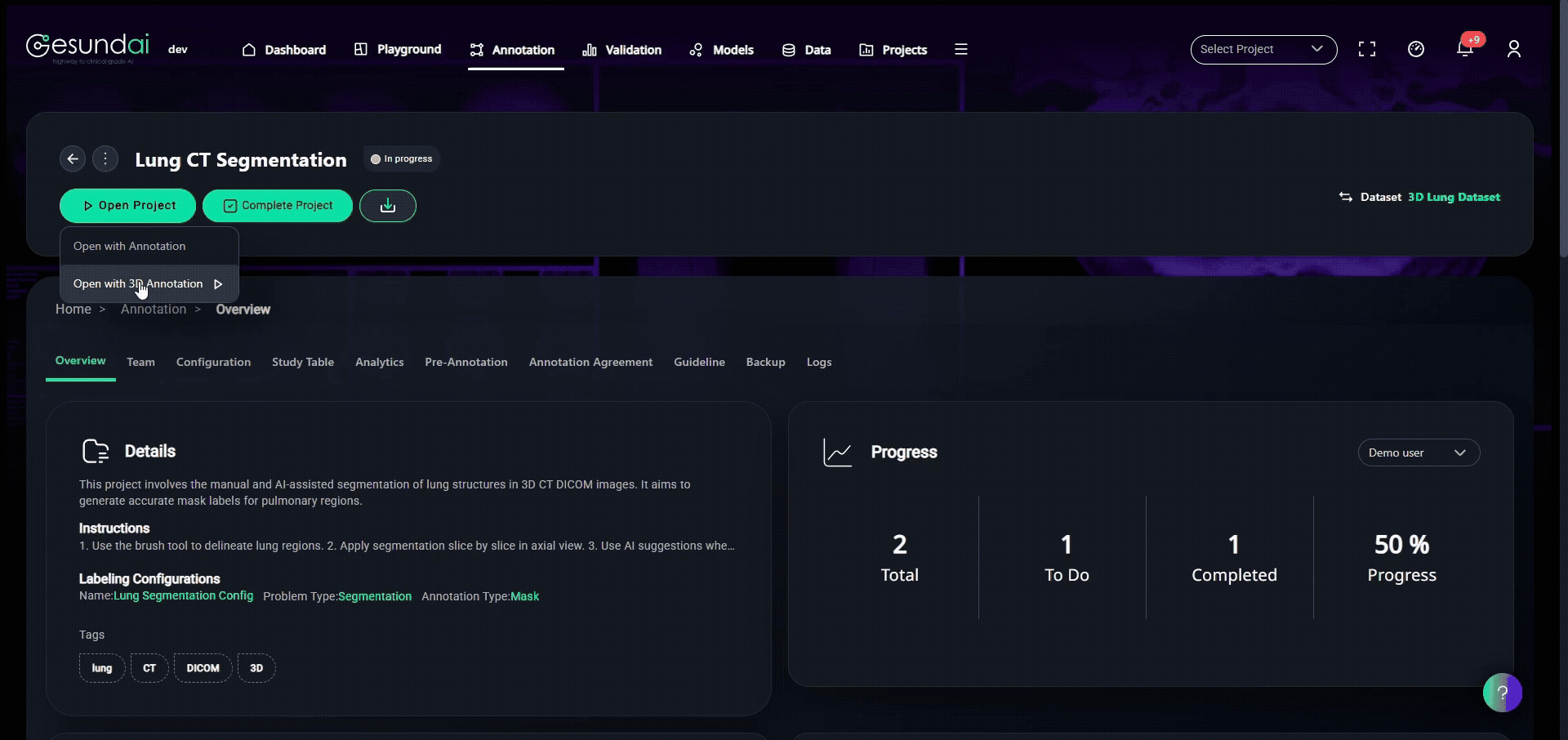
3. 2D Image Annotation
Perfect for high-throughput tasks like X-rays and axial CT slices:
Bounding boxes and masks
Per-class toggle and custom colors
Prediction overlays, object validation states
Versioning, undo history, and metadata tracking
Fast yet clinically precise, ideal for frontline workflows.
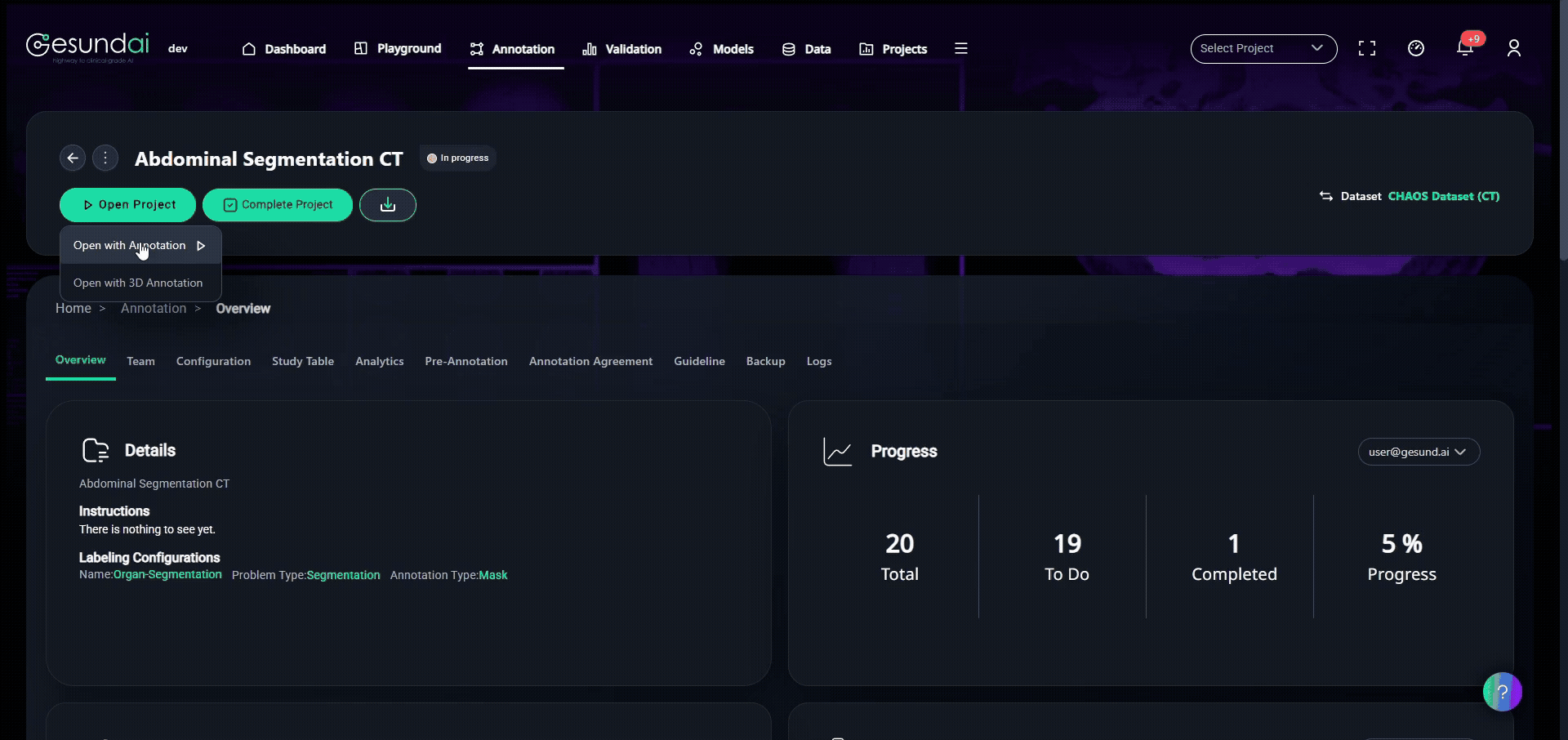
Review, Validation, and Quality Assurance
After annotation, data can be sent to review. Gesund.ai supports:
Multi-phase validation
Inter-rater agreement measurement
Lineage tracking for annotations
Model output comparison
These features go beyond visual QA; they help validate the annotation process itself, which is crucial for clinical-grade AI development.
How Gesund.ai Compares to other Medical Annotation Tools
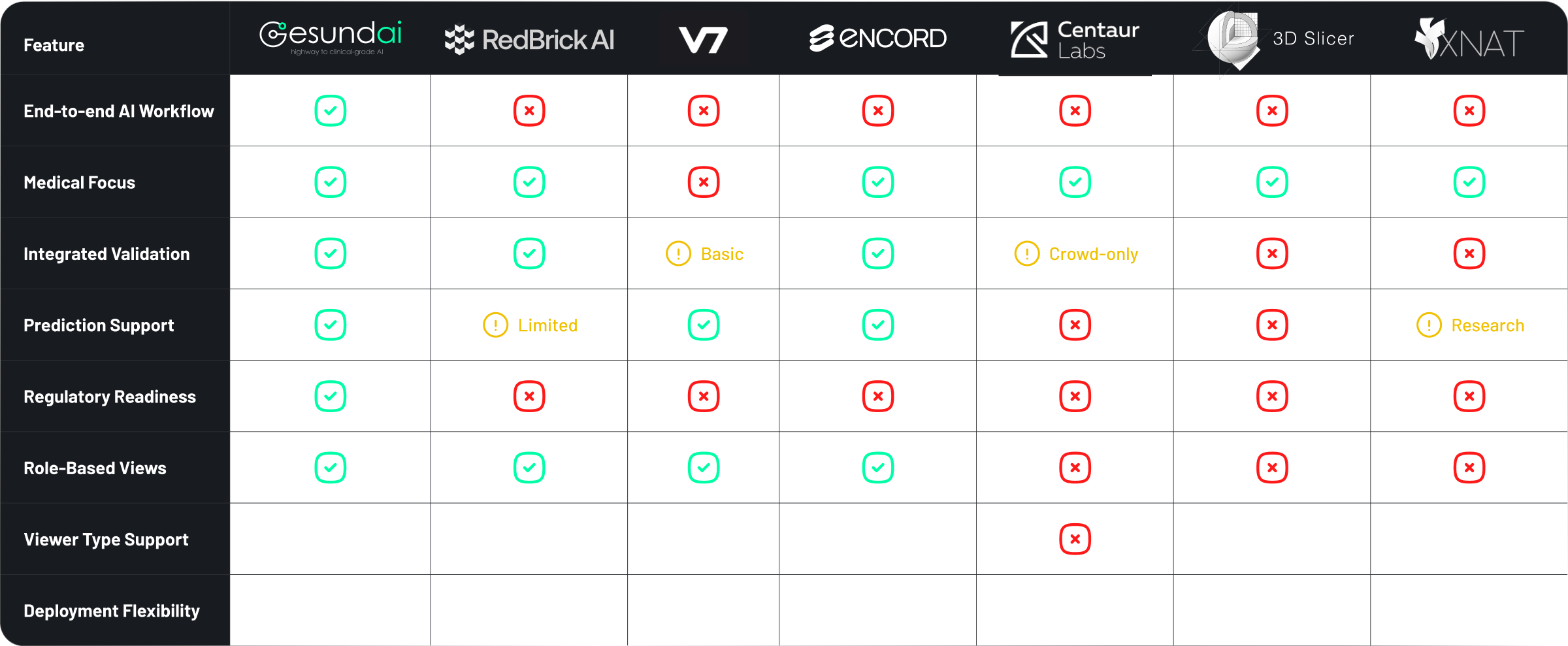
Why Choose Gesund.ai?
Because building medical AI isn't just about drawing labels—it's about creating reliable systems that scale.
With Gesund.ai, you can:
Upload once—no rework for modeling or review
Annotate directly on model results
Compare AI outputs with ground truth
Track label history and object versions
Move from annotation to validation to regulatory readiness—all in one place
Unlike fragmented pipelines, Gesund.ai ’s unified architecture ensures data integrity, reproducibility, and scale—from hospital research to clinical deployment.
Our “all-in-one” architecture ensures consistency across every stage. No disconnected systems. No duplicated effort. No surprises when it’s time to scale. This is how clinical AI becomes real—not in silos, but in symphony.
Final Thoughts
Reliable medical AI starts with tools designed for the job.
Gesund.ai unites annotation, prediction, validation, and compliance into a single, structured, and audit-ready ecosystem. Whether you're labeling organ boundaries or reviewing inter-observer agreement, we streamline the entire lifecycle of AI data—from pixel to publication.
Built for medical AI teams. Connected from day one. Ready for what’s next.
Want to see it in action? Book a demo and start annotating today.
